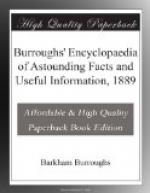MATERIALS USED IN WRITING.
Having a suitable desk or table, arranged with reference to light, in order to learn to write, it is necessary to be provided with proper materials. Writing materials abundant and so cheap in these times that no excuse is afforded for using an inferior or worthless quality. The materials consist of Pens, Ink and Paper.
PENS.
Steel pens are considered the best. Gold pens have the advantage of always producing the same quality of writing, while steel pens, new or old, produce finer or courser lines. Notwithstanding this advantage in favor of the gold pen, steel pens adhere to the paper, and produce a better line. The pen should be adapted to the hand of the writer. Some persons require a coarse pen, and some fine. Elastic pens in the hand of one writer may produce the best results, while a less flexible pen may suit the hand of others best. Pens are manufactured of almost an infinite grade and quality, in order to suit the requirements of all. About the only rule that can be given in selecting pens, is to write a few lines, or a page, with each of the pens on trial, and then compare the writing. If it be shaded too heavily, select a less flexible pen, if the hair lines are too delicate, select a coarser pen.
INK.
Black ink is always preferable. That which is free from sediment and flows well, should be selected. Use an inkstand with broad base as being less liable to upset. With persons in learning to write it is perhaps best to have a quality of ink which is perfectly black when put on the paper, in order that they may see the results of their labor at once. Business men and accountants prefer a fluid ink, however, which, although not black at first, continues to grow black, and becomes a very bright and durable black, notwithstanding the action of light and heat. Avoid the use of fancy colored inks, especially the more gaudy, such as blue, red or green, in writing all documents which you desire to command attention and respect.
PAPER.
There are almost as many grades of paper to be found in the stationery stores, as there are of pens. For practicing penmanship, nothing is more suitable than foolscap, which may be easily sewed into book-form, with cover of some different color, and thus serves every requirement. The paper should have a medium surface, neither rough and coarse, or too fine and glazed. Have a few extra sheets beside the writing book, for the purpose of practicing the movement exercises and testing the pens. Be provided at all times with a large-sized blotter, and when writing, keep this under the hand. Do not attempt to write with a single sheet of paper on a bare table or desk; there should be many sheets of paper underneath, in order to make an elastic surface.




